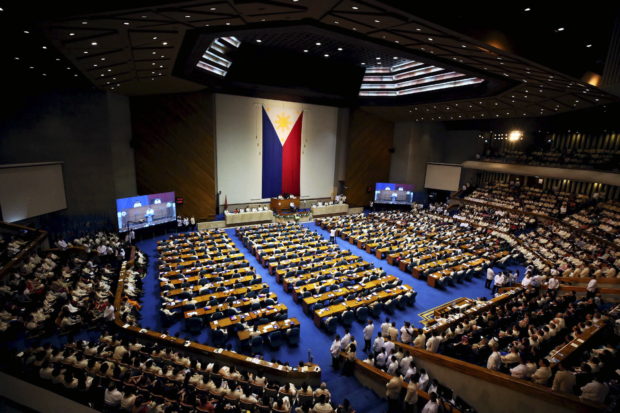
Batasang Pambansa plenary. —MALACAÑANG FILE PHOTO
MANILA, Philippines — A proposal to repeal the country’s old procurement law and create a new version has been passed in the House of Representatives on third and final reading.
House Bill (HB) No. 9648 or the New Government Procurement Reform Act, was approved on Tuesday with 251 lawmakers voting in favor of the proposed measure, and only three going against it.
None of the lawmakers present abstained.
HB No. 9648, a consolidation of 15 bills including one from Speaker Ferdinand Martin Romualdez, seeks to repeal Republic Act No. 9184 or the Government Procurement Reform Act and replace it with an Electronic Procurement System, which authors believe would promote “greater transparency, accountability, operational efficiency, and value for money.”
“The Philippine Government Electronic Procurement System (PhilGEPS) shall be the single electronic portal that shall serve as the primary channel and source of information in the conduct of all procurement activities by the government for the acquisition of goods, infrastructure projects, and consulting services,” Section 6 of the bill read.
“To take advantage of the significant built-in efficiencies of the PhilGEPS and the volume discounts inherent in bulk purchasing, through the centralized procurement undertaken by the Procurement Service – Department of Budget and Management (PS-DBM), all procuring entities shall utilize the PhilGEPS virtual store for the procurement of CSEs including its additional innovative features and solutions,” it added.
Section 9 of the bill meanwhile mandates government agencies to engage in interconnectivity to streamline procurement processes in the following areas:
- Department of Trade and Industry (DTI) on its database relating to business registration, list of all ongoing projects in the public and private sector; and records of priority domestic goods
- Construction Industry Authority of the Philippines (CIAP) on the contractor’s performance evaluation system (CPES) and the Philippine Contractors’ Association Board (PCAB) on the licensing of contractors
- All LGUs on their issuance of permits and licenses;
- Bureau of Internal Revenue (BIR) on tax returns and clearance
- Securities and Exchange Commission (SEC) and CDA on the mandatory submission of all registered enterprises and beneficial ownership information
- Procuring entities with established electronic procurement system and website on the status of projects, contracts and performance of its respective winning bidders
- Other relevant government agencies as may be determined by the GPPB
Changes to the procurement law were pushed by no less than President Ferdinand Marcos Jr. In his State of the Nation Address last July 2023, Marcos said that the government needs a new law on procurement and government auditing, to ensure that state agencies are able to keep up with the demands of the modern age.
READ: New government procurement reform bill advances
According to Budget Secretary Amenah Pangandaman, the 20-year-old Government Procurement Law needs to be amended if the country wants to solve its problem of underspending, or agencies not being able to utilize the entirety of its funds before a fiscal year ends.

